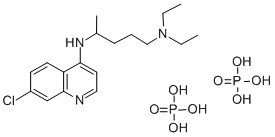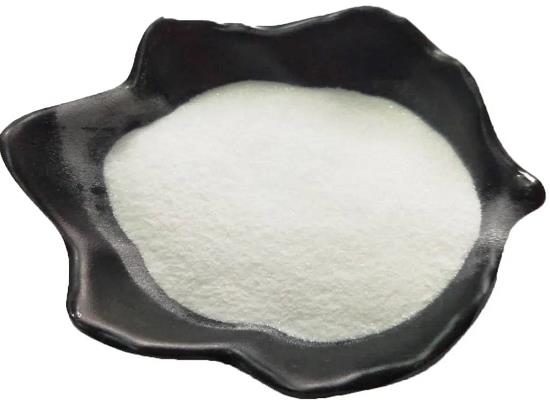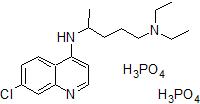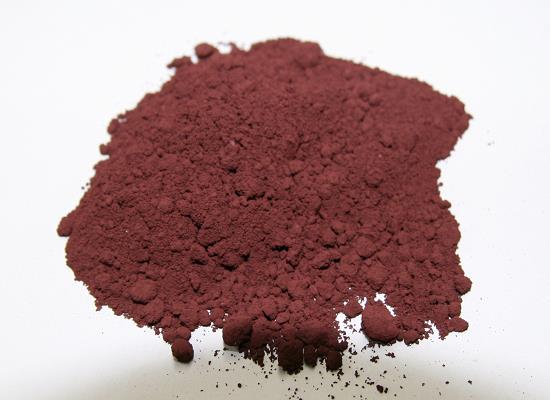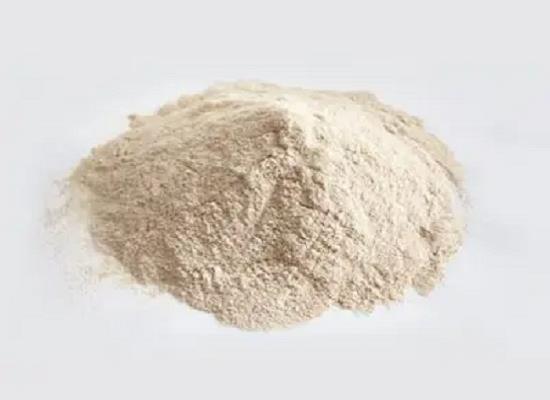Chloroquine diphosphate: pharmacokinetics and clinical applications
General Description
Chloroquine diphosphate exhibits a wide range of clinical applications. Primarily, it is used in the treatment of malaria, effectively targeting and inhibiting the growth of the malaria parasite. Additionally, chloroquine diphosphate is utilized for the treatment of amebiasis, as it can effectively inhibit the intra-cellular growth and multiplication of the parasite. It is administered orally and shows favorable safety and tolerability. Furthermore, chloroquine diphosphate has shown utility in managing rheumatoid arthritis by reducing joint damage and swelling through its anti-inflammatory properties. While its efficacy may vary among patients, it holds potential as an adjunctive therapy for this chronic autoimmune condition.
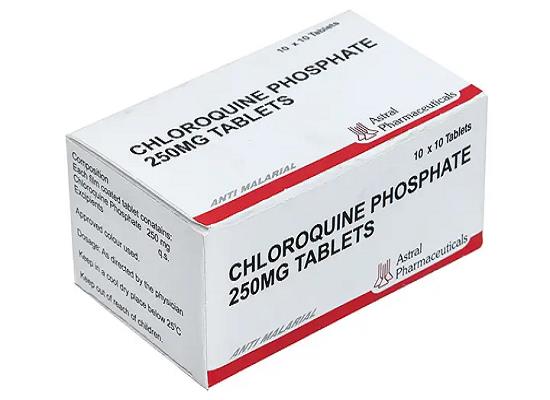
Figure 1. Chloroquine diphosphate
Pharmacokinetics
Chloroquine diphosphate is administered orally and intravenously in beagle dogs. The blood concentration-time profile shows a biexponential decay. The mean terminal half-life (T1/2) is 12.6 days with i.v. data alone and 14.5 days with simultaneous oral and i.v. data fitting. The drug has a wide distribution in tissues (mean Vdss of 53.3 liters/kg). Chloroquine and its major metabolite, desethylchloroquine, can be detected in blood for 42 days after oral administration. In vitro testing shows desethylchloroquine has similar activity to chloroquine against chloroquine-sensitive strains of Plasmodium falciparum, while bisdesethylchloroquine is less active. 1
Clinical applications
Treatment of malaria
Chloroquine diphosphate is an antimalarial drug that has been widely used in the treatment and prevention of malaria. It exerts its therapeutic effects by interfering with the growth and replication of the malaria parasite within the red blood cells. Chloroquine has been particularly effective against Plasmodium falciparum, the most common and deadliest species of the malaria parasite. It is often used in combination with other antimalarial drugs to improve its efficacy and reduce the risk of developing drug resistance. In the context of malaria treatment, chloroquine is administered orally in tablet form. It rapidly accumulates in the parasites acidic digestive vacuole, thereby raising the pH and inhibiting the parasites ability to break down hemoglobin. This disrupts the parasites nutrient supply and ultimately leads to its death. 2
Treatment of amebiasis
Chloroquine diphosphate has been used in the treatment of amebiasis due to its anti-protozoal activity. It acts by inhibiting the intra-cellular growth and multiplication of the parasite, causing its death. Chloroquine diphosphate is effective in treating both intestinal and liver amebiasis, including amebic liver abscess. The drug is administered orally in the form of tablets or suspension, and is well tolerated by most patients, with few reported side effects. However, certain conditions like retinalopathy, lupus erythematosus, and myopathy may limit its use in some patients. Chloroquine diphosphate has also been found to be effective in reducing the recurrence rate of amebiasis following treatment with other anti-protozoal drugs. Therefore, it is widely used as a first-line treatment for amebiasis. The main advantages of chloroquine diphosphate are its low cost, ease of administration, and safety profile. However, it is important to note that chloroquine diphosphate may not be effective against certain strains of Entamoeba histolytica that have developed resistance to the drug. In such cases, alternative treatment options may be considered. 3
Treatment of rheumatoid arthritis
Chloroquine diphosphate has also found utility in the treatment of rheumatoid arthritis. Rheumatoid arthritis is an autoimmune disease characterized by chronic inflammation and joint damage. Chloroquine may also have direct effects on synovial tissue and joint structures. Studies have shown that it can inhibit the release of enzymes and inflammatory mediators from synovial cells, potentially reducing joint damage and swelling. Furthermore, chloroquine has been reported to possess immunomodulatory and anti-inflammatory properties that contribute to the improvement of clinical symptoms and disease activity in patients with rheumatoid arthritis. It is important to note that while chloroquine has demonstrated efficacy in some individuals with rheumatoid arthritis, its effectiveness may vary among patients. Overall, the application of chloroquine diphosphate in rheumatoid arthritis highlights its potential as an adjunctive therapy for managing this chronic autoimmune condition. 4
Reference
1. Aderounmu AF, Fleckenstein L.
Pharmacokinetics of chloroquine diphosphate in the dog. J Pharmacol Exp
The, 1983, 226(3):633-639.
2. Jensen M, Mehlhorn H. Seventy-five years of Resochin in the fight against malaria. Parasitol Res, 2009, 105(3):609-627.
3. Wolfe MS. The treatment of intestinal protozoan infections. Med Clin North Am, 1982, 66(3):707-720.
4. POPERT AJ, MEIJERS KA, SHARP J, BIER F. Chloroquine diphosphate in rheumatoid arthritis. A controlled trial. Ann Rheum Dis, 1961, 20(1):18-35.
You may like
Related articles And Qustion
Lastest Price from Chloroquine diphosphate manufacturers

US $5.00-0.50/KG2025-05-15
- CAS:
- 50-63-5
- Min. Order:
- 0.10000000149011612KG
- Purity:
- 99% hplc
- Supply Ability:
- 5000kg

US $5.00-0.50/KG2025-05-14
- CAS:
- 50-63-5
- Min. Order:
- 1KG
- Purity:
- 99% hplc
- Supply Ability:
- 500TONS
